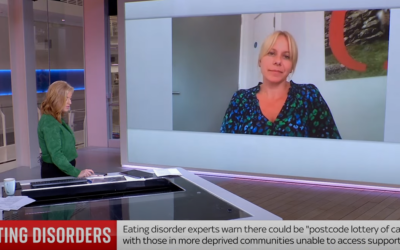Eating Disorders Awareness Week
26 February – 3 March 2024
What is Eating Disorders Awareness Week?
Eating Disorders Awareness Week is a moment for all to reflect on eating disorders, tackle stigma, and learn how we can address and overcome barriers to ensure that recovery becomes possible for all.
The theme for Eating Disorders Awareness Week is set by UK eating disorders charity, Beat. Over the years, they have inspired the sector to look at themes such as medical training in eating disorders, the binge eating disorder diagnosis, and spotlighted diversity in eating disorders to overcome harmful myths and stereotypes.
It’s important to know that you are not alone if you are experiencing symptoms of an eating disorder.
Talk to our specialist team
If you want to talk more about eating disorders, or you’re looking to support a loved one, contact our expert team today.
1.25 million+
people in the UK have an eating disorder.

EDAW 2024: ARFID
This year, Eating Disorders Awareness Week is shining a light on ARFID (Avoidant Restrictive Food Intake Disorder).
Having only been added to the The Diagnostic and Statistical Manual of Mental Illnesses (a reference tool used by the American Psychiatric Association) in 2013, ARFID is still a relatively unknown eating disorder. However, symptoms can be highly disruptive, severely impacting someone’s mental and physical health and relationships.
ARFID is estimated to impact 1 in 10 people, and particularly those with specific co-occurring diagnoses, such as Autistic people or those with gastrointestinal issues.
ARFID usually occurs in children but often carries on to adulthood, leading to a sense of distrust towards food except for a select few “safe” foods.
Sadly, people can suffer for many years without knowing that they have ARFID, mislabelling themselves as a “picky eater” but with symptoms that severely disrupt their mental and physical health and relationships.
Awareness of this condition is vital to ensure people get the specialist support they need and deserve.
Free ARFID Resources

Online Workshop
Orri’s specialist team are offering a free, 30-minute information session to share more about the ARFID diagnosis and explain what meaningful and effective treatment can look like.

ARFID Workbook
Download our free ARFID workbook created for EDAW 2024, including stats, facts and advice from our expert team of therapists.
The different types of eating disorders
Anorexia
An eating disorder characterised by restricted food intake, an intense fear of gaining weight, and a distorted body image, leading to significantly low body weight.
Bulimia
Involves episodes of compensatory behaviours, such as purging (vomiting), fasting, or excessive exercise, often preceded by binge eating. Individuals with bulimia may maintain a ‘normal’ weight.
Binge Eating Disorder (BED)
Characterised by recurrent episodes of eating large quantities of food in a short period of time (bingeing), and often experiencing shame, distress, or guilt afterward, without regular use of compensatory activities.
ARFID (Avoidant Restrictive Food Intake Disorder)
ARFID is a relatively new eating disorder diagnosis referenced in the DSM-5.
Previously coined “Selective Eating”, it involves limitations and/or restrictions around food, particularly around the intake of certain types of food or certain amounts.
Orthorexia
Involves an unhealthy obsession with eating only foods perceived as healthy, often leading to nutritional deficiencies and social isolation.
Anorexia Athletica
A condition associated with excessive and compulsive exercise, often accompanied by disordered eating behaviors, with the primary goal of fitting a specific athletic aesthetic or performance.
Diabulimia
Refers to an eating disorder experienced by individuals with Type 1 Diabetes, where someone will deliberately manipulate their use of insulin for weight loss purposes, leading to serious health complications.
OSFED (Other Specified Feeding or Eating Disorder )
Represents a category of eating disorders that do not meet the strict criteria of disorders like anorexia or bulimia but still involve significant disordered eating behaviors that cause distress or impairment.

Eating disorders are complex mental illnesses.
Anyone, regardless of age, gender, ethnicity or background, can develop one.
How Orri can help
Orri is a specialist eating disorder treatment clinic. We treat individuals aged 16+ all eating disorder diagnoses and co-occurring conditions.
Offering face-to-face, personalised treatment – both in person and online – programmes follow a stepped approach so that treatment evolves with each individual client as they progress in recovery.
At the heart of the Orri team is the belief that recovery is possible for all. We work collaboratively to provide expert, evidence-based treatment with kindness and compassion at its core.
Our blogs
ARFID stands out amongst other eating disorders due to its unique characteristics and diagnostic criteria. This blog post explores further.
Many individuals living with ARFID have been mistakenly labelled as “picky eaters”. Here’s how they differ.
Your non-negotiables hold yourself accountable in eating disorder recovery. We explore more in this blog.
“Scared is what you’re feeling. Brave is what you’re doing.” Our social media community share how they have been brave in their recovery this August.
Eating disorder recovery requires bravery. It requires someone to show up for themselves, every day, and communicate their needs to loved ones and professionals around them.
This is a blog for those of you who have been struggling with an eating disorder in silence. Perhaps you have been contemplating treatment and are not sure where to start. However you have landed, we are here for you.
Orri CEO Kerrie Jones talks to Sky News about the impact of COVID-19 on eating disorder rates
FAQs
What percentage of the UK population has an eating disorder?
Studies suggest that 19% of women and 13% of men aged over 16 could have an eating disorder.
When is Eating Disorder Awareness Week in the UK 2024?
Monday 26th February – Sunday 3rd March 2024.
What age is most likely to have an eating disorder?
Anyone of any age can develop an eating disorder, however, they often develop between the ages of 16-35. Eating disorders can often manifest during life challenges and transition periods.
What are the reasons people develop an eating disorder?
Certain factors may increase the risk of developing an eating disorder, including:
- Family history. Research suggests that 50-80% of a person’s risk can be explained by genetic factors
- Social factors. Life experiences or milestones, particularly moments of transition (like moving schools, homes, loss or divorce) can create emotional distress
- Other mental health diagnoses or psychological factors. Eating disorders often co-occur with other mental health diagnoses such as anxiety, depression, OCD, and personality disorders
- Experiencing trauma. Negative life experiences – whether they are sudden or more drawn out – can cause emotional distress that prompts someone to cope through food
What country has the highest percentage of eating disorders?
Comparatively speaking, eating disorders are most prevalent in Western countries like the United States, the United Kingdom, and Canada.
However, different populations experience eating disorders differently. What’s more, prevalence depends on how accurately diagnostic rates are tracked.
If you have concerns about your relationship to food and your body, simply reach out. We’re here to talk it through.










